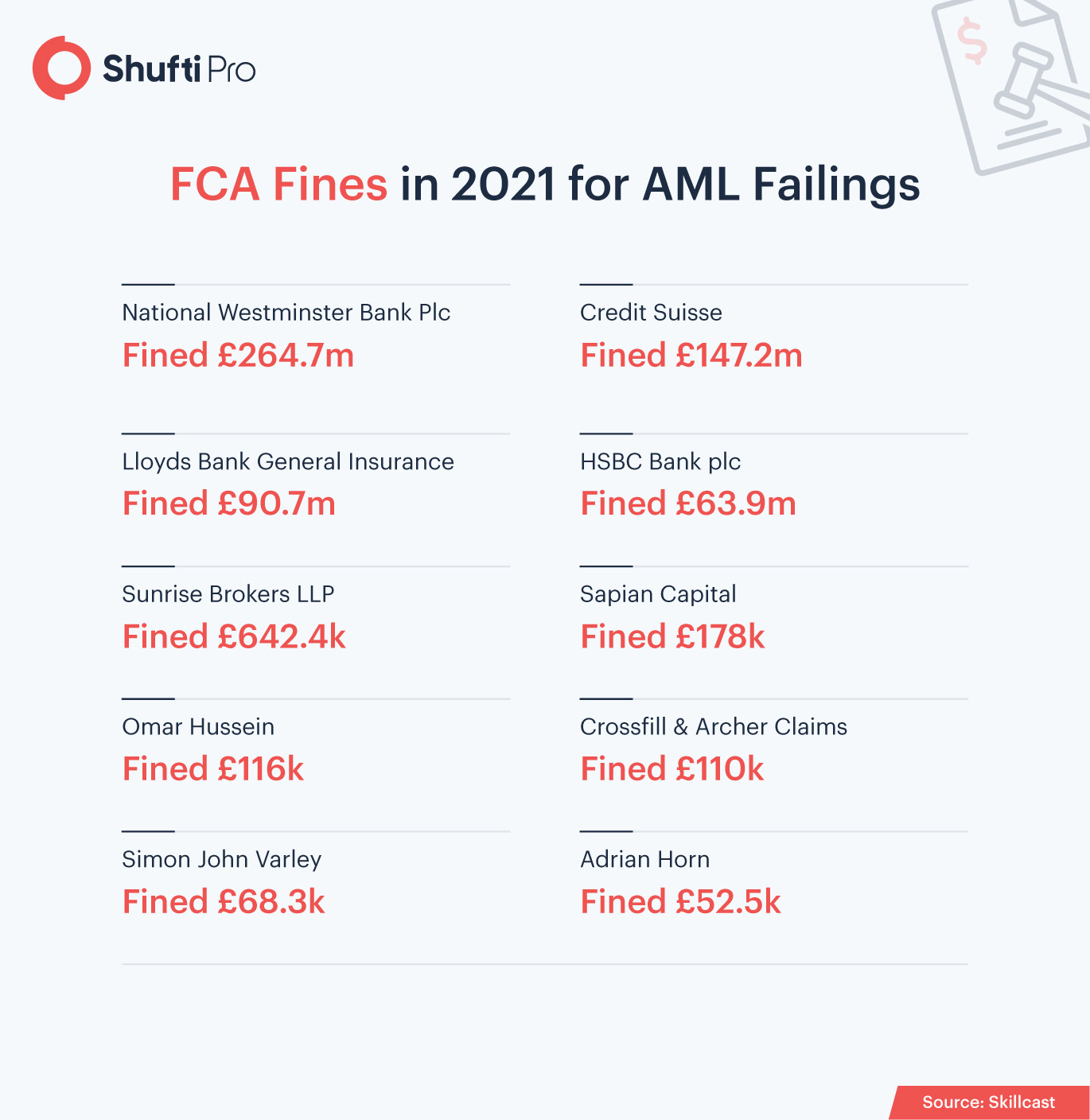UK Watchdogs Hit Financial Institutions with Record AML Fines in 2021

A dramatic increase in Anti-Money Laundering (AML) fines was seen in 2021 as financial watchdogs issued record-breaking penalties to banks. As the eye-watering penalties are not coming exclusively from US regulators, financial experts say that they are observing a shift in the narrative when it comes to AML compliance fines.
Considering the trends in fines issued by the Financial Conduct Authority (FCA) in 2021, the beginning of the year saw fewer fines. However, by the end of the year, the amount in fines had doubled to more than half a billion. In the first half of 2021, the FCA handed out penalties totalling £298,000.
Record-Breaking AML Fines in the UK
Although the next few months didn’t see any large AML fines, the amount exceeded £300 million in the last month of 2021. As compared to 2020, the total value of fines in 2021 was more than doubled, and also surged past the peak fines recorded in 2019. The largest fine in December 2021 totaled more than all the fines in the whole of 2020.
NatWest Bank Plc
For the first time ever, the FCA went on to invoke criminal charges on a bank for AML failings. The penalty was issued for NatWest’s failure to adequately monitor the financial transactions of Fowler Oldfield during the years 2012 to 2016. Fowler Oldfield, a Bradford-based jewelry business reportedly deposited £264m at NatWest. The several red flags in this deposition included large numbers of Scottish banknotes, as well as notes having a specific fusty smell. Moreover, the individuals who deposited the cash in different NatWest branches were showing signs of suspicious behavior.
NatWest employees at the different branches did take steps to report the suspicious activity to the anti-money laundering investigators, but no responsive action was taken by the bank. To add to the misery, NatWest’s automated transaction monitoring system misinterpreted some of the cash deposits as cheques. This augmented the bank’s failure in verifying customers’ transactions. After it was fined by the FCA, the bank pleaded guilty and got the fine reduced by a third.
Mark Steward from the FCA stated, “NatWest is responsible for a catalog of failures in the way it monitored and scrutinized transactions that were self-evidently suspicious. Combined with serious systems failures, like the treatment of cash deposits as cheques, these failures created an open door for money laundering…Anti-money laundering controls are a vital part of the fight against serious crime, like drug trafficking, and such failures are intolerable ones that let down the whole community, which, in this case, justified the FCA’s first criminal prosecution under the Money Laundering Regulations.”

Credit Suisse
Credit Suisse was fined with the second-largest amount of £147 million for due diligence failings. The bank arranged and issued loans worth more than $1.3 billion to the Republic of Mozambique, where a bond exchange was also involved. As a result of the corruption, Credit Suisse not only had to pay the fine for financial crime but also exempted a US$200 million debt owed by the Republic of Mozambique.
Between October 2012 and March 2016, Credit Suisse was unable to adequately manage the risks of money laundering within its structure. According to the FCA, an unacceptable level of bribery was seen in the two Mozambican loans (and bond exchange) pertaining to government-sponsored ventures. According to the bank, they were completely aware and had sufficient information of corrupt government officials in Mozambique, and the contractor interacting with the bank was described as the “master of kickbacks”.
Although Credit Suisse employees managed to obscure the kickbacks, red flags of potential corruption should have been analyzed by the bank’s anti-money laundering team. The bank’s constant lack of scrutiny and monitoring when the risk factors were surging led to the FCA issuing a fine of approximately £147.2 million. The Republic of Mozambique later stated that the minimum sum of bribes paid pertaining to the two loans is US$137 million.
“The FCA’s fine reflects the impact of these tainted transactions which included a debt crisis and economic harm for the people of Mozambique. The fine would have been higher if not for Credit Suisse agreeing to provide the debt write-off of US$200 million. The FCA will continue to pursue serious financial crime control failings by regulated firms,” said the FCA.
Lloyds Bank General Insurance
The FCA also issued fines to Lloyds Bank General Insurance Limited, St Andrew’s Insurance Plc, Lloyds Bank Insurance Services Limited, and Halifax General Insurance Services Limited for failure to ensure clear communication. According to the FCA, millions of home insurance renewal documents had unclear language, were unfair, and misleading.
Between January 2009 and November 2017, LBGI sent 9 million renewal communications to insurance customers with misleading language stating that they would receive competitive renewal prices. The ‘competitive price’ phrase was not justified by the bank. Despite several opportunities to address the issue, the bank kept sending renewal letters without amending the wording.
As a consequence, a new risk of harm was caused as there was a possibility that the quoted price at renewal would increase as compared to the previous amount. Moreover, renewal premiums offered to customers who renewed repeatedly were also higher than the amounts offered to new or switching customers.
Furthermore, LBGI also issued letters to half a million customers stating that they will receive a discount based on ‘loyalty’, and that they were a ‘valued customer’. However, the discount was never applied and the bank had no plans to provide any discount. This misleading letter negatively affected more than 1.2 million renewals, with around 1.5 million letters being sent by the LGBI.
It was not before the FCA’s investigation that Lloyds Bank recognized and eliminated these issues. The FCA did not require Lloyds Bank to address individual customers who received renewal letters, including the ‘competitive’ renewal premium claim.
Later, LBGI voluntarily paid approximately £13.5 million to the customers who received communications regarding renewal premiums and is currently contacting customers actively. This means that the customers do not have to take any steps to get back their payments.
According to the General Insurance pricing practices market study, the financial watchdog determined that insurance premiums are increased on a yearly basis as individual renews their aim to recover any financial loss. However, this affects the existing clients to pay more money at the time of renewing the insurance than a new insurer holding the same risk unless they shopped around.
Suggested read: Lloyds Banking Group Initiates “Pilot Scheme” to Combat Frauds
“Firms must ensure their communications with customers are clear, fair, and not misleading. LBGI failed to ensure that this was the case. Millions of customers ended up receiving renewal letters that claimed customers were being quoted a competitive price which was unsubstantiated and risked serious consumer harm.”
How Financial Institutions Can Avoid AML Fines
The increase in AML compliance fines in 2021 indicates the loopholes in the financial system that allow criminals to get away with their illicit purposes. Many such financial institutions like Deutsche Bank have faced multiple penalties in consecutive years.
Considering the record AML fines, it has become a necessity for financial institutions to incorporate AML screening solutions into their system. Shufti’s robust AML solution screens against 1700+ global watchlists to identify possible red flags in order to secure financial institutions.
Want to learn more about AML Compliance for financial institutions in the UK?

 Explore Now
Explore Now













